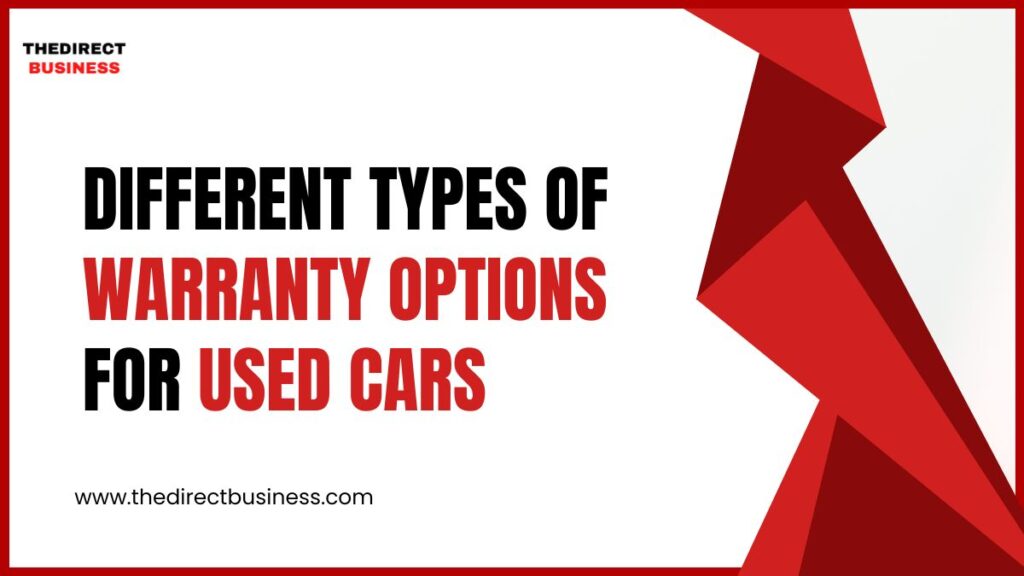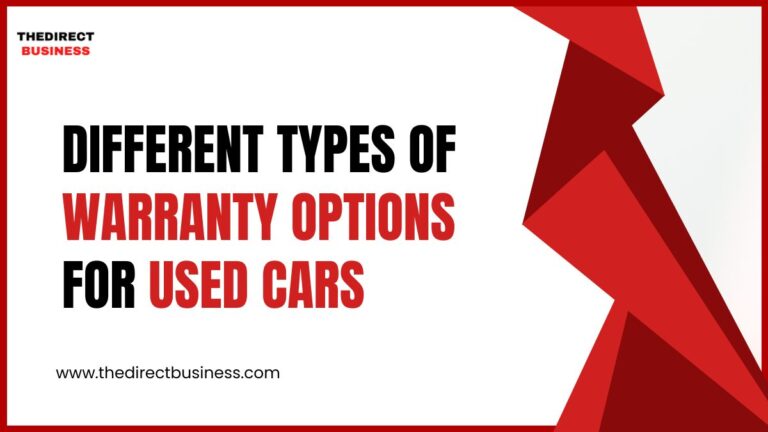
The warranty is one of the most significant variables when purchasing a pre-owned car. A warranty offers reassurance and financial security in case of unanticipated repairs or breakdowns. In any case, not all guarantees are made equivalent. Utilized auto guarantees arrive in various structures, each with its inclusion and conditions. This article will inspect the different guarantee options to give you the data you want to go with a good choice.
The Warranty Options for Used Cars
1. Producer’s Warranty
The maker of the car offers the manufacturer’s warranty, sometimes referred to as the factory warranty. Generally, it is accommodated as a foreordained measure of time or distance, whichever starts things out. Manufacturer warranties range in length and scope, but they frequently cover important parts and systems, including the drivetrain, engine, and gearbox. These guarantees offer complete protection and are typically regarded as the most dependable and valuable. You can check used cars on CARS24 for good prices and warranties as well.
2. Warranty for Certified Pre-Owned Vehicles
Automobile manufacturers provide Certified Pre-Owned programs for used cars that satisfy certain requirements. These programs frequently involve a thorough examination and refurbishment procedure. CPO warranties add to the original manufacturer’s guarantee by offering extra protection for a set time or several miles. CPO warranties are well-respected because they provide superior protection and quality assurance.
3. Extended Warranty
A service contract, usually an extended warranty, is a supplemental coverage option that can be acquired from a different vendor. These warranties prolong the manufacturer’s warranty protection over its initial expiration date. Extended warranties can be tailored to the buyer’s needs and price range. They encompass a range of systems and components, although the extent of coverage and the conditions might differ greatly across suppliers. Before making a purchase, it is vital to completely peruse the service contract’s agreements. Check used cars on CARS24 for extended warranties on old cars, which can give you an idea about how the extended warranty works.
4. Vehicle Warranty
The motor, gearbox, and drivetrain are the three primary pieces of the vehicle’s powertrain covered by a powertrain guarantee. In addition to the manufacturer’s guarantee, this kind of warranty is frequently provided independently or as a part of a CPO program. Powertrain guarantees offer protection against mechanical breakdowns or flaws in these vital parts. However, they frequently do not cover other parts or systems, such as suspension or electrical systems.
5. Specified Component Warranty
Manufacturers or third-party suppliers may give component-specific assurances that cover particular components or systems of the vehicle. An extended warranty can cover some engine parts, air conditioning, or electrical systems. These warranties may not cover additional parts or systems, but they do cover the specified parts or systems. They are often provided as extensions of current warranties or separate coverage options.
6. Owner’s Warranty
Dealerships selling pre-owned vehicles frequently provide warranties ranging in scope and duration. These warranties are not uniform, and they might vary greatly between dealerships. Before making a purchase, it is fundamental to concentrate completely on the terms, limitations, and states of the seller guarantee.
7. Independent Warranty
Independent businesses that specialize in extended warranty coverage provide third-party warranties. These warranties may offer complete programs or coverage for a range of components. To guarantee trustworthy coverage and speedy claims processing, you must do your homework and pick a reputed third-party warranty provider.
8. As Is Sale
You can come across the “as-is” warranty or no warranty while purchasing a used automobile from a private seller or specific dealership. A “with no guarantees” deal involves the vendor making no guarantees and that the purchaser is liable for all dangers connected with the vehicle’s condition. Before gaining a vehicle with a “with no guarantees”, it is fundamental to conduct an extensive assessment, research the vehicle’s set of experiences, and have the vehicle examined by a specialist.
9. Warranty from bumper to bumper
Most of the vehicle’s frameworks and parts are covered by a heavily congested guarantee, likewise called an extensive guarantee, except for mileage. This kind of guarantee protects against various repairs and offers comprehensive coverage that is frequently compared to the warranty provided by the original manufacturer.
10. Technology Warranty
Some automakers now provide high-tech warranties that explicitly cover cutting-edge electronic components like infotainment structures, navigation systems, and cutting-edge safety measures as automobiles grow more technologically complex.
11. Rust/Corrosion Warranty
Certain manufacturers provide assurances that cover rust or corrosion-related repairs. The vehicle’s degree of rust or corrosion is usually considered when determining the coverage requirements and periods for these warranties.
12. Warranty for Emissions
Lawfully required emissions warranties cover any replacements or repairs to the vehicle’s emissions management systems. Compared to other guarantees, these warranties frequently have a longer length.
13. Warranty for Wear and Tear
Repairs for wear-and-tear components, including brake pads, tires, and wiper blades, are covered by some types of warranties. Over time, these guarantees help to lower maintenance expenses.
14. Portable Warranty
If the vehicle is sold inside the guarantee period, an adaptable guarantee empowers the guarantee inclusion to be moved to another proprietor. This can increase the vehicle’s worth and give future owners confidence.
15. Tyre Guarantee
Tyre warranties cover tyre faults like tread separation or blowouts. They frequently differ in length and scope; some may be offered by the tyre manufacturer rather than the car maker.
16. Warranty for Roadside Assistance
Warranties that include roadside assistance offer help in the event of problems like flat tyres, dead batteries, or mechanical failures. They frequently involve assistance with lockouts, gasoline delivery, towing, and jump starts.
17. Minimum Warranty
The warranty owner with a deductible must pay the deductible for each service or repair visit. The warranty provider pays for the remaining expense. Lower warranty expenses could be attained with higher deductibles.
Conclusion
It’s essential to comprehend the various warranties available for used automobiles to make an informed choice and safeguard yourself from unanticipated repair bills. Reviewing the terms, restrictions, and limits is essential, whether it’s the manufacturer’s warranty, certified pre-owned warranty, extended warranty, or any combination. A happy and trouble-free ownership experience will also result from researching, like checking used cars, finding reliable warranty providers, and properly checking the vehicle before purchasing.
